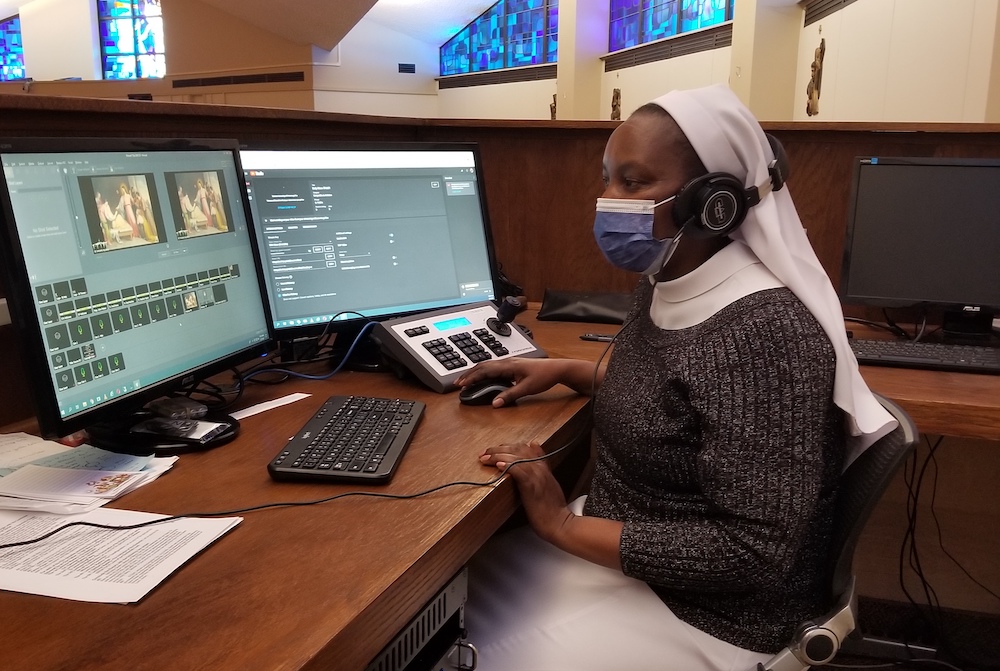
Sr. Teresia Mutiso streams Mass to those unable attend due to the coronavirus pandemic at St. Thomas Aquinas Church in Binghamton, New York. (Provided photo)
In March 2020, students were sent home for what we thought was two weeks, or one month if prolonged. We thought this strange, and unprecedented. In no time, the churches were also on lockdown. Again, this was unparalleled. The collective expression was, "I have never seen the church buildings closed for communal service in my lifetime." But harder still is to see nursing homes closed for almost a year so far.
Generally, when tragedy hits a community, the community seeks — and finds refuge in — the church. This time around, it was different. The schools were closed, people worked from home, and the churches were closed, too. In time, we were all homebound, and the church had to find a way of reaching out to its parishioners in their homes.
Suddenly, the whole family was at home, day and night. Despite the sheltering in place, there is isolation, fear and anxiety about the pandemic, loss of employment, and change of plans for major events in life, and the lack of warning was unnerving. It dawned on me that I was dealing with "intra-COVID Pandemic Stress Syndrome" in my life and around me.
Despite the challenges, I was reminded of Hans Selye's adage that says, "Stress is the spice of life; the absence of stress is death." I had to remind myself that every challenge provides an opportunity. I decided to intentionally look for the silver lining in the clouds, in spite of the storm.
It was touching to connect with others at different levels and just know that I am not going crazy, or to hear somebody say the same. I remember a friend telling me how her elder sibling kept calling and saying, "I love you." She found this strange at first, until she realized that her sister was expressing worry and anxiety because of the fear of the unknown presented by the pandemic. The one thing her sibling had total control over was to let her loved ones know how much she cared for and loved them.
In a different scenario, a mother called her daughter every day just to say good morning or good night; for the mother, it was her way of fighting the anxiety and fear. Initially, this was strange to the daughter because though they were close, that didn't involve calling daily or twice daily.
A mother of a teen told about how, when calling a fellow parishioner to find out how they were doing, they bonded over the fact that they had children the same age. They both admitted that they were getting a cold shoulder from their children — who have had to shelter in place with their parents instead of being in school. They said it was such a relief to know that they were not unique in their parenting challenges during these unprecedented times.
I am not a "computer native," though I can get by fine. But in the last year or so, I have found my church community and attended meetings and retreat and have socialized through Zoom or livestreamed services. We look forward to the time we meet in the chat area. We share what is going on, what we are going through.
Advertisement
But above all, it just feels consoling to know that we are in this fight against the pandemic together. We seek, we yearn, we share and we listen. We belong, we love, we pray together. We are a part of a community. The times are different, but we are searching together. It's the little things of life that point to the grace of the moment. The shared laugher, or pain or frustration, keeps us going and grounded.
So, what does this mean for us as Christians, as we approach the Lenten season 2021?
With the advent of a vaccine, we hope to see the light at the end of the tunnel. We can expect to go back to some normalcy in the near future. But more deeply than that, during the Lenten season we emphasize — among others — three lifestyle practices: prayer, fasting and almsgiving.
At this time, my trust in the Lord has been challenged greatly. Most of the time, I take pride in doing things for the Lord. I say a few novenas, increase the list of the people I need to pray for.
But maybe the Lord is asking me to be, rather than to do. To be more trusting, and know that those who trust in the Lord are like a tree planted beside a running stream. That, in the big plan, every piece fits well. That all things work well if we trust in him. I plan on waking every day to thank him for his faithfulness, and I believe that each day will be the best ever so far because he is present in it. That he is God, and he gets it, and he has got our backs, all of us, his beloved children.
Then for fasting: I could fast from the idea that my opinion is the only one that counts. I could be more tolerant of others' opinions even if I differ with theirs. I could empathize more, and try and understand what it feels like to walk in other people's shoes — especially those who see things very differently from me.
While for almsgiving: I can give my time — time is valuable — and probably try to create more time to intentionally listen to others. Listening heals. It heals the listener and the listened.
Finally, in just talking to others, I discovered that it is the simple things in life that anchor us. In spite of the complexities of our society, things like spiritual, social or moral support offered in a simple telephone call, in chat areas, text messages — or just watching a sun set with someone — warm our hearts in unexpected ways. Thus, tweaking these simple ways of communication can and has broken the sense of isolation, fear and loss.
Dear God, we pray for the wisdom of Solomon, the simplicity of St. Theresa, the joy of St. Francis, and the peace of St. Joseph during these turbulent times. Amen.







